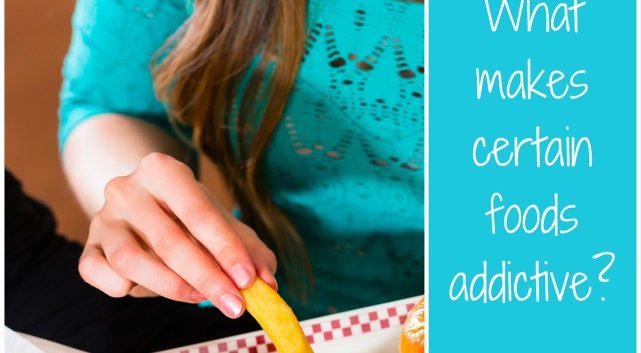
What makes a food addictive?
Are there certain qualities that make you want to binge-eat some, while eat others in the recommended portions?
Why is it that you can be very content and satisfied with a yummy plate of quinoa, steamed veggies and sauteed salmon… but you can’t stop eating a bag of chips or carton of ice cream?
A lot of it has to do with the fact that these foods are highly addictive, causing reactions in the brain similar to drug users getting their next high.
Rich, fatty, sugary, palatable foods release dopamine in the brain. Dopamine interacts with neurotransmitters, such as opioids and other chemicals in the brain, to provide a sense of well-being, some “feel good” feelings.
The body creates its own opiods, including endorphins, enkephalins, dynorphins, and endomorphins. These chemicals make us feel very blissful! {remember this scene from Legally Blond?}
What Are Endorphins?
Endorphins are an opiod and release the same “feel good” dopamine chemicals as eating highly palatable, fatty, rich foods.
What Makes a Food Addictive?
These following qualities are what make foods addictive, at least for some people.
They raise dopamine levels the highest.
Processed foods
High sugar/high glycemic carbs
High fat
Salt
They have ingredients combined in unnatural ways that enhance the addictiveness.
Sugar & fat combinations
Fast food
Manufactured Foods and Fake Food Products
High fructose corn syrup
Artificial sweeteners
Limit These Foods
The first step in overcoming your addiction and to help you with your binge, emotional stress eating, is to limit these foods and keep them out of your normal eating patterns.
Keep the foods that tempt you, your trigger foods, out of the house. These foods are giving you your “fixes,” which you need to start letting yourself have. Protect your environment by protecting yourself from these temptations.
Give Your Body Healthy FIXES
Make sure you are giving your body things that produce dopamine release in healthy ways… such as exercise or habits that five you a sense of pride, happiness or achievement. Maybe a new project, spending time with good friends, and making sure that you are eating real food to help re-calibrate your brain chemistry.
Resources: Institute for Natural Resources, 2014, “Food Addiction, Obesity & Diabetes” seminar.
